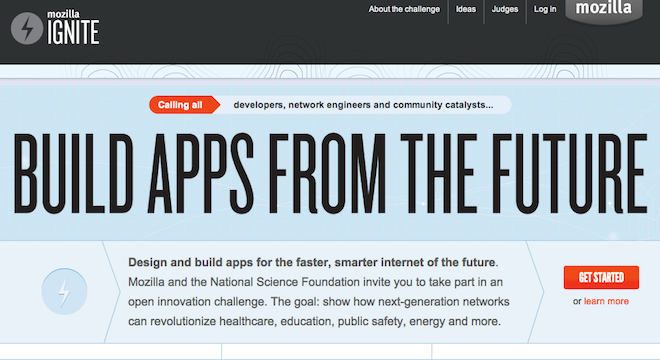The White House on Wednesday unveiled “US Ignite,” a massive new public-private collaboration to spur development of new software that will remake the Internet itself for the broadband era.
Fittingly, Mozilla, the nonprofit company behind the Firefox browser, is one of the major companies hoping to fuel the development of the new apps.
“Mozilla works to promote openness, opportunity and innovation on the Internet,” said Ryan Merkley, Mozilla’s chief operating officer, in an email to TPM. “The US Ignite program is a way for the public to directly contribute their skills and ideas to the future of the web. We believe it will drive innovation both through the apps that are created, but also through the investment in high speed infrastructure that benefits everyone. ”
Mozilla and the National Science Foundation are teaming up to launch “Mozilla Ignite,” a competition that will doll out a total of $500,000 in NSF prize money in chunks to third-party developers that come up with the best apps in any of five areas: advanced manufacturing, education and workforce technologies, public safety, healthcare, and clean energy/transportation. Mozilla’s rounded-up a who’s who of the technology sector for its judges, including big-name venture capitalists and executives at Tumblr and Amazon, among others.
The competition has already begun, with Mozilla hosting a “brainstorming round,” where developers can pitch app ideas through August 23 and get feedback from others, but aren’t actually required to submit a prototype type. Even in this round, there’s a $15,000 prize for the best idea.
“You don’t need to be a developer or technologist to participate — at this stage we’re just seeking good ideas,” Mozilla’s Ignite webpage reads. “All are welcome!”
So far just nine ideas have been submitted, including promising ones like a cloud-based artificial intelligence system that could host the programming for multiple robots, crowd-sourced surveillance system called “Little Brother,” (apparently not a tongue-in-cheek reference to the novel that denounces the surveillance state). Other ideas are more vague, such as an app that would aggregate all of a young person’s personal information and one that seeks to create “virtual” companies, which seems to be based largely off the idea of a remote workforce.
But Mozilla is eager to see all sorts of app ideas, not just those that fit the typically definition of a web or smartphone application.
“Mozilla also wants to demonstrate that open web technologies like HTML5 can and should be the platform for developing apps on gigabit networks,” Merkley elaborated to TPM. “US Ignite’s goal is to foster 60 transformative applications in five years in national priority areas. We hope that the challenge will be a big part of that, either through apps created, or the ideas generated by everyday citizens.”
The official first round of the competition, which requires developers to submit prototype app ideas, will conclude on October 25 with $85,000 in prize money awarded, the second round December 19 with $150,000 in prize money and the third March 27, 2013 with $250,000 in prize money awarded. Participation is open to all, regardless of nationality, but prizes can only be collected by U.S. citizens. Entrants are also limited to three submissions in total, across all three rounds.
Correction: This article originally misidentified Mr. Merkley as Mozilla’s “chief marketing officer,” when it fact he is the company’s “chief operating officer.” We have since corrected the error in copy and regret it.









